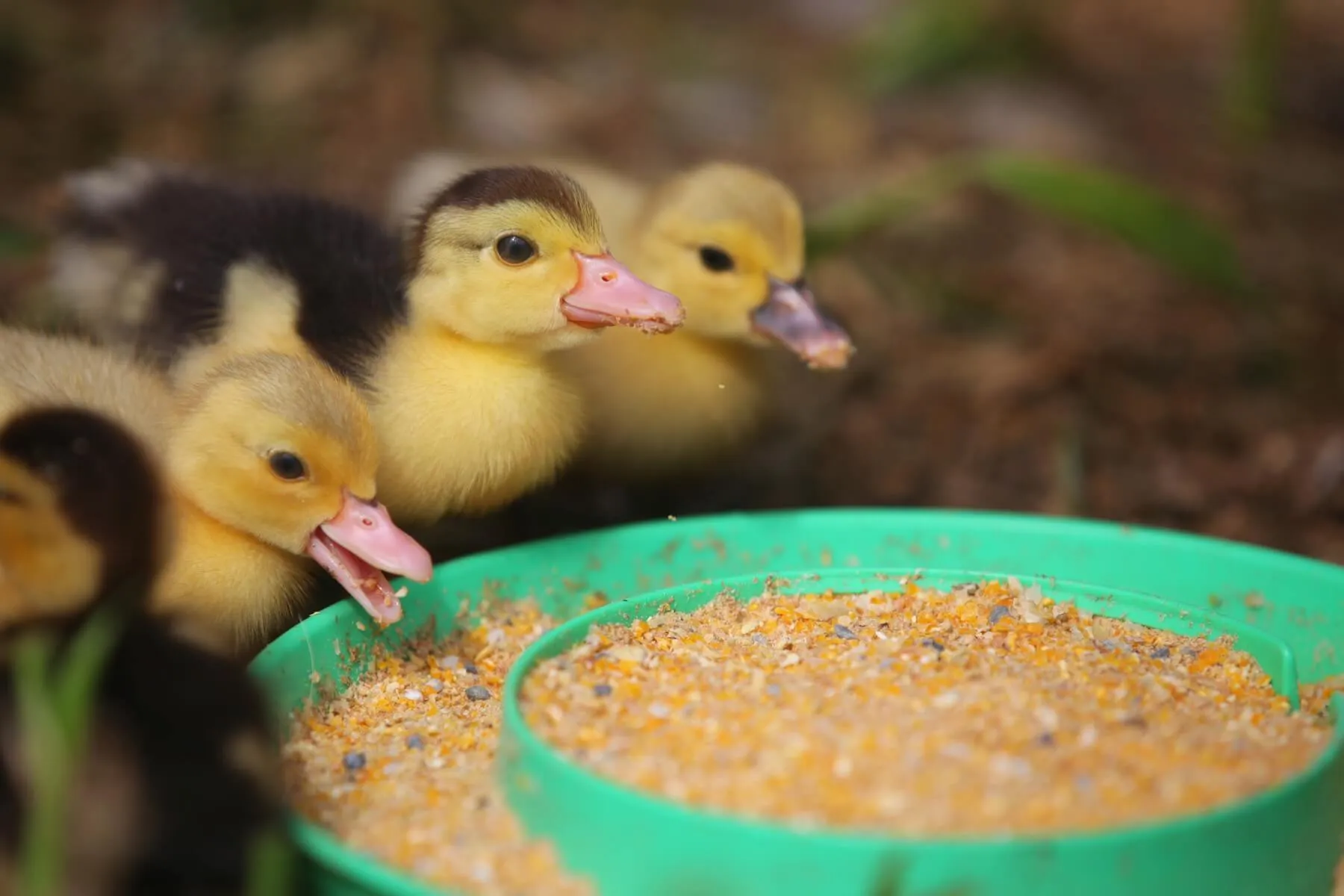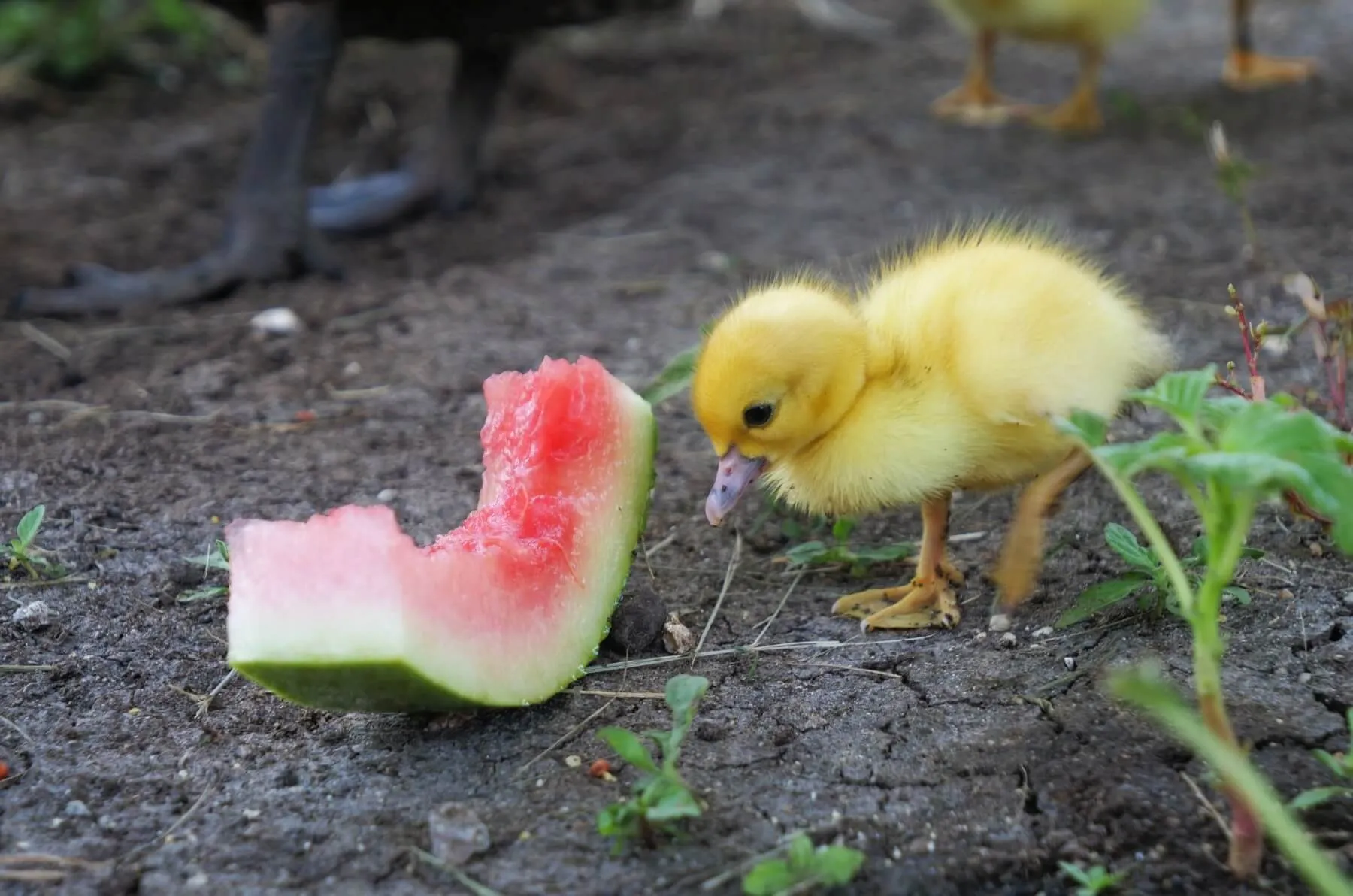A proper diet is one of the most important parts of giving your new ducklings a healthy, happy start in life. Fortunately, it’s not rocket science. Here are the four components of a healthy, balanced duckling diet, ten things you shouldn’t feed your ducklings, how much to feed them, how to provide the feed, and some extra tips.
Disclosure: This post contains affiliate links. As an Amazon Associate, I earn a commission if you purchase something through a link on this post, at no additional cost to you.
1. Commercial Feed

Commercial feed will compose the staple of your ducks’ diet, throughout their life. Waterfowl feed, such as Mazuri Waterfowl Starter or Purina Flock Raiser, is the best diet for a duckling. Unfortunately, feed specially made for waterfowl is difficult to find in many areas, so you may have to go with chick feed.
There are two main types of feed made for chicks: starter and grower. Starter is higher in protein (20-24%) and grower is lower (15-18%). Ducklings should eat starter for their first two or three weeks, and then it’s best to switch them to a lower-protein “all-flock” feed or grower feed, as feeding grower for more than two or three weeks can increase the risk of the high protein causing angel wing.
These are the two best feeds for young ducklings:
To the best of my knowledge, there are no duckling-specific grower feeds available. You can either continue to feed starter feed, switch to chick grower feed, or switch to all-flock feed. You may also mix duckling starter with all-flock crumbles.
Crumbles are the best form of feed for ducklings. Mash is acceptable, but wet it so they don’t choke on the loose powder. Pellets are usually too large for small ducklings to consume.
2. Niacin
Ducklings and chicks have similar nutritional requirements, which is why chick food is fine for ducklings—except for niacin, or vitamin B3. Ducks have higher niacin dietary requirements than chickens, so if you feed them chick starter, you will need to add niacin. Failing to do this may result in niacin deficiencies. You can feed niacin by adding brewer’s yeast to their feed, at a rate of about 1/2 cup of brewer’s yeast per 10 pounds of feed. You can also supplement with liquid or powdered nicain. Do NOT get flush free, no flush, slow release, or extended release niacin. These will do no good for ducklings.
Here are the products I recommend:
3. Greens
Who wants to eat the same dry mash day in, day out? Give your ducklings some healthy variety. If circumstances and weather allow, let them outside so they can find grass of their own (in a safe, sheltered area, of course, or at least under supervision). If you can’t bring them outside, or not often, bring them some chopped up grass and weed clippings to play with in their brooder.
You can also feed them bits of veggies and fruits. At first, when they’re really small, you’ll probably have to cut it into small pieces for them. Peas, cucumbers, tomatoes, watermelon, cabbage, strawberries, and lettuce are common favorites. Here’s a list of treats you can feed your birds (although many foods are difficult for ducklings to eat): https:

Keep in mind that greens alone should not compose the majority of the diet. Veggies and fruits by themselves do not make a balanced diet. Too much of them can cause your ducklings to have protein deficiencies or other problems.
4. Grit
Since ducks don’t have teeth, they use grit, in the form of small rocks and sand, to chew up their food. Here’s how to tell whether you need to feed your ducklings grit or not:
- Are they outside foraging every day? If they are, they can probably find their own grit by picking through bits of dirt and sand, and thus you do not need to feed them grit.
- Are they in a brooder and eating nothing but commercial feed? I don’t recommend this, but if so, there’s no need for grit because there’s nothing that needs to be chewed up.
If you answered no to both of those—basically, if they’re not outside full-time, but are getting food aside from commercial feed, you need to feed them grit.
Oyster shell is not a good source of grit for ducklings because it is so high in calcium. Instead, offer free choice chick grit.
Read more: Insoluble Grit for Ducks: Complete Guide
What Not To Feed
- Bread, especially white bread, is low in nutrition and unhealthy to feed in large quantities. It’s basically junk food.
- Cat food contains high quantities of methionine, which could possibly kill your ducks.
- Spinach prevents calcium absorption, which is especially dangerous for adult females but can also harm ducklings. If you feed spinach, it should be in very small amounts only.
- Avocado is toxic to ducks (and many other animals).
- Chocolate is also toxic.
- Onions are toxic in large quantities.
- Dry or undercooked beans contain hemagglutinin and are toxic.
- Citrus is extremely acidic and may cause digestive problems in ducks.
- Raw green potato peels are toxic.
- Salty, sugary, or high-fat foods are dangerous for ducks. The same goes for carbonated beverages, coffee, alcohol, or anything considered junk food for humans, like French fries or pepperoni.
This list also holds true for adult ducks AND chickens.
Read more: What Ducks Can and Can’t Eat: The Ultimate List
Remember: just because they love it does not mean it’s good for them. And just because you fed one of these foods to your birds before and they didn’t die does not mean it’s healthy for them.
Adult laying mash is too low in protein and too high in calcium for ducklings. Some say the extra calcium will be deadly. Personally, I’ve never had problems with feeding ducklings layer mash. However, that doesn’t mean it’s healthy, and I still recommend against it, just to be safe.
Also, some people ignorantly feed their ducks scratch or raw grains and think it is all their birds need for food. This is untrue. Although grain can make up a large part of their diet, it is not high enough in protein to be a complete diet and is not a substitute for commercial feed.
Is medicated feed bad for ducklings?
The idea that medicated feed for chicks is bad for ducklings because they eat more than chicks and thus overdose themselves has become widely spread and is preached by many. However, it seems to be a misconception.
The coccidiostat in chick feed, usually amprolium, is used to prevent coccidiosis. It’s not an antibiotic; it’s just a thiamine blocker. Amprolium is considered to be safe for ducks as long as they don’t overdose. The sulfa drugs used long ago in feed were not safe for ducks, which is probably where the myth began, but those drugs are no longer used (in the United States, at least; if you live in a foreign country, you might want to check what drug is being used as the medication). In general, there is little need to worry about feeding your ducklings medicated feed.
Ducks don’t need the medication, though. Ducklings are not as susceptible to coccidiosis as chicks and there is absolutely no need to feed them medicated feed. From my perspective, if you have the choice between medicated and unmedicated feed, the unmedicated feed would be the better option, because why feed it if you don’t have to? And who knows—there could still be hidden side effects of amprolium that are not known yet. Or perhaps overdosing is still an issue. Even Dave Holderread states in his book, Storey’s Guide to Raising Ducks, that nonmedicated feed is preferable when possible.
Here’s a link from Metzer Farms about feeding medicated feed to ducklings: Can Medicated Feed Be Used for Waterfowl?
Here’s a study: Anticoccidial drugs and duckling performance to four weeks of age
How much feed and how often?
Ducklings digest food quickly, so they need food often. Feed young ducklings free choice, so it’s always available. At the very least, feed ducklings three times a day. It’s fine to have dedicated feeding times (such as once in the morning and once in the evening) for adult ducks, but not for ducklings. Don’t worry about them overeating. Just make sure they always have access to food or are fed multiple times a day.
How to feed it?
Chick gravity feeders don’t work well for ducklings, because ducklings will make their feed wet and clog up the feeder. Ducklings also love to empty the contents of the feeder into their bedding or onto the ground.
Those long plastic feeders with sixteen or more holes work okay, but ducklings outgrow them very quickly and they end up causing wastage because the ducklings can’t completely empty them (unless you open the lid and leave the feeder open).
Small pans and bowls (ones that the ducklings can’t tip over) work well, although they need to be cleaned often as the ducklings will not only wet them but will also walk in the feed and may poop in it. But any ducklings feeder will need to be cleaned out at least once a day because ducklings get their food so wet, so for me, pans and bowls are the way to go. I like to use the bottom piece of a chicken gravity waterer or feeder while my ducklings are very young, then switch to a dog food bowl, rubber feed pan, or flowerpot saucer.
Summary
- Feed your ducklings waterfowl feed or chick starter.
- If you choose chick starter, supplement with niacin.
- Supplement with vegetables and other greens.
- Add grit if they are eating anything other than commercial feed and cannot find grit themselves.
- Don’t feed bread, cat food, spinach, avocado, chocolate, onions, dry or undercooked beans, citrus, raw green potato peels, or salty, sugary, or high-fat foods.
- Medicated feed is okay, but non-medicated feed is preferable.
- Feed free choice.
- Chick feeders aren’t the best choice for ducklings; open bowls work better.
Leave a comment
Your email address will not be published.